"The war of the newspaper" by General Milyutin
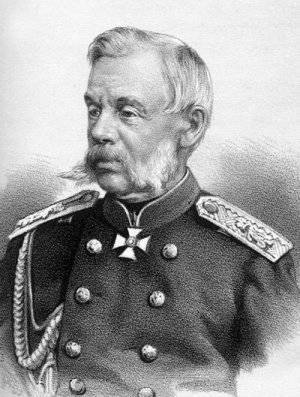 - Your Excellency, from Prince Vasily Andreevich Dolgorukov package.
- Your Excellency, from Prince Vasily Andreevich Dolgorukov package.The War Minister, Field Marshal-General Count Dmitry Alekseevich Milyutin, tore his eyes away from the papers laid out on the table, waved his hand - let him come here. The adjutant, stiff at the door, hurried to the huge mahogany table where the minister was sitting.
The official message from the chief of the gendarmes and the head of the III department of the office of his imperial majesty was hardly foreshadowed. A few days earlier, when they met, they bowed coldly. Not a word was said.
With curiosity, the Minister of War was printing a message from the chief of the gendarmes. It could reveal the reason for the change of the formerly favorable attitude of Prince Dolgorukov to Milutin.
By letter, the Minister of War was informed that the sharp tone of articles on the Baltic issue in the Russian Disabled People caused discontent of Emperor Alexander II. The newspaper of the military department was ordered to stop the attacks on the Germans.
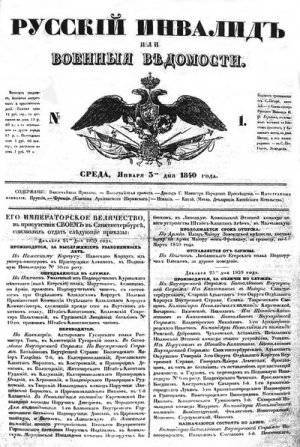 “Ah, that’s about the dearest prince Vasily Andreevich,” smiled the Minister of War. He got up from the table to stretch his legs, which had become numb from the almost three-hour sitting. The adjutant, who carefully waited for further orders, took two steps to the side, continuing to keep the face mask of waiting on his face.
“Ah, that’s about the dearest prince Vasily Andreevich,” smiled the Minister of War. He got up from the table to stretch his legs, which had become numb from the almost three-hour sitting. The adjutant, who carefully waited for further orders, took two steps to the side, continuing to keep the face mask of waiting on his face.“Thank you,” Milutin dismissed an officer from his office.
When the door closed behind him silently, Milyutin went to the window. It was getting dark. Thoughts again returned to the letter of Prince Dolgorukov, to the intrigue associated with it.
ESSENCE The so-called Ostsee question, which has recently and again been raised in Russian society, was as follows: the German aristocracy, which held a dominant position in the Baltic States, strongly opposed reforms there, trying to preserve almost medieval order.
The fight against these aspirations of the German aristocrats was led by the newspaper "Russian disabled" and "Moscow Gazette". But if the newspaper of Mikhail Nikiforovich Katkov accused the Baltic nobility of “German separatism”, considering the case from the position of great-power chauvinism, then in “Russian Disabled People” they looked at the situation differently.
A recent issue, from 10 April 1865, was still lying on the table of the Minister of War. Dmitry Alekseevich took the newspaper in his hands, ran his eyes over a well-known text, which, as it were, summed up the discussion that had lasted for several months:
“... The question is not about separatism, not about national German aspirations, but about the purely class aspirations of that small party, which still holds in voicelessness and lack of rights both the entire Finno-Latvian population, and the Russians, and not at all belonging to the privileged ... The order that exists in the Ostsee region, the estate monopoly of a close corporation of several hundreds of immatured nobles and several hundred thousand privileged citizens of exclusively German origin, who do not admit either to their environment or to participation in the public Of all the civil affairs, not even to the full enjoyment of civil rights, neither the mass of the Finno-Latvian population, nor the Russians living in the province, nor other ethnic groups, were discovered by us in all of our nakedness. ”
Colonel of the General Staff Sergei Pavlovich Zykov, editor of the “Russian Disabled Person”, who is obliged to come to Milutin every day at 9 hours of the evening and present him with any outstanding articles, read this article even before the newspaper was published.
Milutin reported on the essence of the publication to Alexander II. And, knowing his Germanophile sentiments and confidence in the inviolability of the traditional union of Russia with Prussia, which allegedly is only capable of preserving peace in Europe, the Minister of War tried to circumvent sharp corners, assuring that the newspaper contributes to the transformations in the Baltic region. The emperor trusted Milyutin's mind and his ability to understand the most complicated problems, and therefore approved the proposed reflections.
Meanwhile, this and all previous articles of similar content have caused a backlash in the German press. The defenders of the Baltic nobility showed up not only in the Baltic States, but also abroad - in Prussia and other German states. They had strong support at the Russian court. The Ostsee party chose an aggressive tone immediately, starting to accuse the representatives of the opposite camp of persecuting people of German nationality.
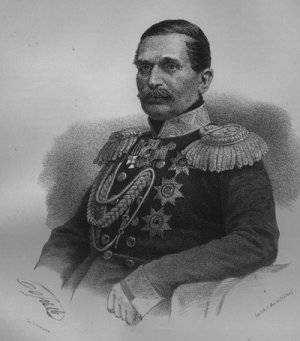 ONE of the influential supporters of the Ostsee Germans, was the military governor of St. Petersburg, Adjutant General Alexander Arkadyevich Suvorov, Prince of Italisky, Count Rymniksky. The grandson of the famous commander was not only warmed by the rays of his ancestor's glory, but even saved from fate fate, which did not pass others. Being the Junker of the Life Guards of the Horse Regiment, he met with some members of the Northern Society, was privy to his plans and even "agreed to take part if he did not see anything contrary to feelings and conscience."
ONE of the influential supporters of the Ostsee Germans, was the military governor of St. Petersburg, Adjutant General Alexander Arkadyevich Suvorov, Prince of Italisky, Count Rymniksky. The grandson of the famous commander was not only warmed by the rays of his ancestor's glory, but even saved from fate fate, which did not pass others. Being the Junker of the Life Guards of the Horse Regiment, he met with some members of the Northern Society, was privy to his plans and even "agreed to take part if he did not see anything contrary to feelings and conscience." However, he participated in the events on the side of the government troops. In the evening, December 14 appeared to Nicholas I with remorse. The emperor freed the cadet from the court and sent him to the Caucasus in the army, noting: "I do not want to believe that the grandson of the famous Russian commander was a traitor."
Service redeemed the young Suvorov guilt, as a result was not left behind neither the ranks nor the awards - he became the knight of all Russian orders without exception. He deserved the appointment of the Governor-General of Livonia, Estonian and Kurland. For thirteen years of office, he was imbued with the spirit there, and then became famous for being extremely baronophilic and anti-Russian.
Having moved to the capital, he set himself a task that seemed to be impossible: to be a friend of the sovereign and to become the most popular person in public opinion. The Germans from the entourage of Alexander II were able to present the new military governor to the emperor in a favorable light. As a matter of fact, they had already worked a lot to ensure that it was Suvorov who became one of the first people of the capital, and now they only consolidated their success.
But Alexander Arkadyevich cared about his popularity himself. Yielding to the influence of the fashionable spirit of reformism and opposition, the military governor began to freak. Then suddenly, as if laughing for the sake of, Chernyshevsky will proclaim publicly his best friend. And that will begin to distribute letters of recommendation to strange personalities. Many institutions were persistently knocked on by young people who showed off nihilism and disrespect for both the past and the existing order; they offered their services to existing vacancies, presenting recommendations of the military governor.
The eccentricities of Adjutant General Suvorov did, according to Milyutin, a lot of harm. The most dangerous thing was that, taking advantage of its proximity to the court, he prevented Russia from pursuing a favorable policy in the Baltics and the Polish kingdom. Especially got from Suvorov, Adjutant-General to Count Mikhail Nikolayevich Muravyov, Governor-General of the North-Western Territory. Without stopping in front of gossip and even outright slander, Suvorov interfered with any display of respect and sympathy for Muravyov, in every way discredited his wise policy in the western regions of Russia. The chief of gendarmes, Prince Dolgorukov, got into the whirl of this intrigue.
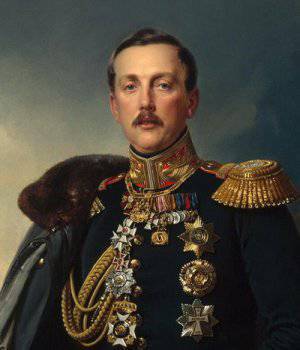 FOR MILITARY Minister attacks on the newspaper "Russian disabled" were attacks on his dear offspring. The “Russian invalid” was created back in the 1813 year, when the Russian army was after the expulsion of the French from Russia in an overseas campaign. In St. Petersburg, the official of the colleague Pavel Pavlovich Pezarovius announced the publication of the newspaper, the entire income from which, minus the costs, "to use for helping disabled people, soldier widows and orphans." And the destitute and needy in St. Petersburg every day became more and more.
FOR MILITARY Minister attacks on the newspaper "Russian disabled" were attacks on his dear offspring. The “Russian invalid” was created back in the 1813 year, when the Russian army was after the expulsion of the French from Russia in an overseas campaign. In St. Petersburg, the official of the colleague Pavel Pavlovich Pezarovius announced the publication of the newspaper, the entire income from which, minus the costs, "to use for helping disabled people, soldier widows and orphans." And the destitute and needy in St. Petersburg every day became more and more. The idea found a response both in society and at court. The matter went so quickly that a special Committee on the Wounded was soon formed, named Aleksandrovsky. The newspaper became its print organ. The collected money helped thousands of heroes of the recent battles with the Napoleonic horde and families left without a breadwinner. However, after decades, when contributions ceased to come with the same regularity, and the reader’s choice with the advent of new newspapers became incomparably greater, Russian Disabled didn’t just bring income to the committee - it became unprofitable. It was necessary to seek every opportunity to maintain the publication. It came to the point that the newspaper was leased for release on a commercial basis.
Milyutin, in fact, revived the newspaper. Appointed in 1860, Comrade of the Minister of War, he suggested that the adjutant general Sukhozanet, who was then in charge of the ministry, take a newspaper from the Committee on the Wounded under the care of the military department. The arguments of Milutin seemed weighty.
Over the past years, the “Russian Disabled Person” has already formed an opinion as a military newspaper - more and more often officers of the General Staff were appointed as editors. Secondly, during the Crimean campaign, it became clear that an official military publication was required, which could publish news of the war, manifestos and decrees, lists of the dead and wounded — anything that could interest the average person. And it was necessary to publish it without intermediaries from among the owners of private newspapers.
"Russian disabled" completely coped then with the role of the military publication. Finally, the flow of anti-government publications from abroad has increased, with many appeals of the so-called revolutionary liberation movement, funded by the British, directly addressed to officers, soldiers, and Cossacks. The echoes of Herzen's “Bell” in London reached the troops and found hearts hurt and self-broken by broken souls.
IN WARSAW in the 1862 year, literally on the eve of the Polish uprising, a small group consisting mainly of officers opened up in the training consolidated team of the rifle brigade. They set about creating a revolutionary organization in the garrison, and the leaders of the circle established contacts with the leaders of the Polish movement.
The elder brother of one of the leaders of the secret organization found out about what was being prepared and reported to his immediate superior that he was sent to the governor to report on a military conspiracy on duty and oath. And he, struck by the singularity of the denunciation - to a comrade and brother, began to persuade him to wait with him and let the conspirators go abroad.
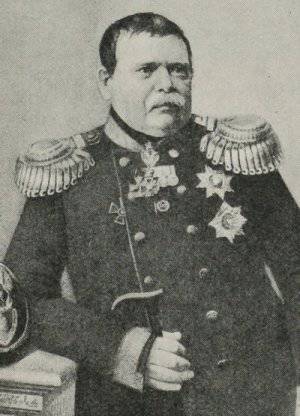 Captain Slavitsky did not heed the admonitions and immediately went to the governor. The conspirators were arrested, and one of them shot himself, one poisoned, some were intercepted at the border. On the night, the officers were arrested in the training team, and the soldiers, on their own initiative, weapons in their hands they broke into the Alexander Citadel, disarmed the guards and freed their commanders.
Captain Slavitsky did not heed the admonitions and immediately went to the governor. The conspirators were arrested, and one of them shot himself, one poisoned, some were intercepted at the border. On the night, the officers were arrested in the training team, and the soldiers, on their own initiative, weapons in their hands they broke into the Alexander Citadel, disarmed the guards and freed their commanders. An alarm was played in the fortress, the troops surrounded the rebels. The head of the training team, Arngoldt, and other officers, not wanting bloodshed, persuaded the soldiers to withdraw, while they themselves remained under arrest.
The disclosure of the plot and subsequent events coincided with the disturbing events in Warsaw and created many difficulties for the government. Therefore, it was decided on a sharp reprisal, which was rarely resorted to, with all the guilty. According to the verdict of the field court, two officers and a non-commissioned officer were shot, one of the non-commissioned officers died under the rods. The rest of the officers were sent to penal servitude, the soldiers went to the convict companies. Approximate punishment cooled other hotheads: in the future in Poland did not have to deal with military conspiracies.
At the height of the investigation, a proclamation was issued to the officers of the Russian army under the signatures of Arngoldt and Slavitsky (whose brother reported the conspiracy) in the Bell. The appeal, calling for a struggle with the existing state system, ended with the words: "We, who are going to die, bow to you."
Of course, the circumstances of the case have become widely known. And the official authorities, in addition to bringing the verdicts to the society and the army, did not enter into any explanations.
Meanwhile, the reaction of the officers of the Guards regiment, who did not allow Captain Slavitsky to report on their environment, and the attempt by the Chief Slavitsky to keep him from reporting the plot indicated the need to give a sample of how the Russian army and every rank should act. Only a newspaper could do it.
30 APRIL 1861 year, shortly before the appointment of Dmitry Alekseevich Milyutin to the post of Minister of War, the highest proposals were approved on the transformation of the “Russian Disabled Person” into an “official newspaper of the military department”. The ministry concluded an agreement on the transfer of rights to publish a newspaper with the Aleksandrovsky Committee of the Wounded with January 1 for the period of six years from January 1862.
The editor-in-chief of the colonel Nikolai Grigorievich Pisarevsky was also selected. He, who had the experience of a writer and a reputation as a military theorist, was charged with updating the publication. However, he did not justify the hopes. First, he made debts - he had to cover the deficit of several thousand rubles from the treasury. Secondly, the newspaper began to be considered "unreliable." The official department published government opinions - decrees, manifestos, rescripts, orders, and the unofficial department editor led so independently and independently, agreeing only with his own ideas about reforms that it appeared as if two completely different newspapers were printed due to someone's oversight. title of "Russian Disabled". As a result, in the fall, Pisarevsky was notified that from 1 January 1863, the contract with him would not be renewed. After receiving the notice, he immediately freed up the editorial space.
From the editorial board. Pisarevsky Nikolai Grigorievich (1821-1895) - head of laying the first in Russia submarine cable from Baku to Krasnovodsk. An outstanding engineer in the field of electrical communications, the organizer and first director of a special electrotechnical university - the Electrotechnical Institute. He graduated from the Polotsk cadet corps, military academy, served in the General Staff as assistant to the chief of the geodesic department of military topographic affairs, then - head of the photographic department of the General Staff. After his dismissal from the army, he worked as an inspector at the Telegraph Department, working on the issues of producing domestic cable, laying underground and underwater telegraph lines.
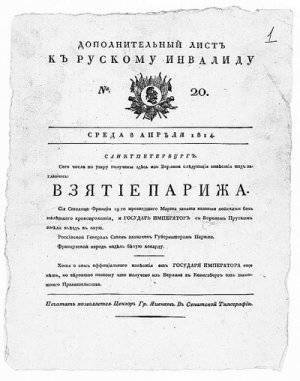 After the mistake with Pisarevsky, he approached the selection of the editor of the newspaper Milyutin more carefully. The editor-in-chief was appointed Colonel of the General Staff Dmitry Ilyich Romanovsky, and Captains Trotsky and Zykov were appointed as assistants to the General Staff.
After the mistake with Pisarevsky, he approached the selection of the editor of the newspaper Milyutin more carefully. The editor-in-chief was appointed Colonel of the General Staff Dmitry Ilyich Romanovsky, and Captains Trotsky and Zykov were appointed as assistants to the General Staff. The Minister of War helped what he could to his brainchild. He understood perfectly well that a newspaper is the most convenient means of disseminating reform ideas not only in the military class, but also in general among the public. Milyutin succeeded in stopping the lease of a newspaper from the Aleksandrovsky Committee about the wounded. From the first issue of 1863 of the year, the “Russian invalid” moved to the direct management of the military ministry. And the income from the publication continued to be in favor of the disabled, and in case of unprofitableness of the publication, the defect was paid to it from the treasury. By the way, after three years the deficit was fully covered by income.
Guardianship of an influential man, like Milyutin, helped raise the newspaper unusually high. He obtained the right to receive foreign newspapers and magazines to the editorial office without prior censorship, he personally entered into relations with all ministries and main departments about the delivery of various information from the editorial board.
“The newspaper is military, scholarly, literary and political,” as it was now listed in its title, became increasingly important in the life of society, it became one of the most influential among print publications in Russia. Starting with 844 subscribers, by the end of 1863, their number was brought to 3.300, later on to 5.500 people.
The test for the Russian army and its newspaper was the Polish insurrection 1863-1864. The 1830-1831 insurgents, who had returned from exile and penal servitude by that time, once again began their conspiratorial work, creating universal confidence that the uprising in Poland against Russia would be immediately supported by armed intervention by France, England and Austria.
But not only the preparation of the armed forces were occupied by the leaders of the uprising. A strong "grassroots terror" was discovered. Russian soldiers and officials were killed, and even more Poles were killed - more casual victims of terrorists. Four years before the uprising, more than 5.000 murders were committed. At the congress of Rzhonda Narodova in December 1862, it was decided to move to decisive actions. The set of recruits scheduled for January was to be the beginning of the uprising. 10 January, 1863, it flared up everywhere.
RUSSIAN the government was extremely alarmed by the situation in the Kingdom of Poland. Empress Maria Alexandrovna, at a farewell audience with Count Muravyov, who was going to Lithuania, expressed the wish that at least this area would be left for Russia - hence, in the royal entourage, the possibility of the loss of Poland would be admitted. The last word was for the army.
In the Polish question, the Minister of War stood in irreconcilable positions, not allowing any concessions, nor a hint of political autonomy. Milyutin was a supporter of the merciless suppression of the uprising, fully endorsed the decisive course of action of the adjutant general, Count Mikhail Nikolayevich Muravyov, at the suggestion of Polish emigrants and Russian revolutionaries who entered history as a "hangman". Meanwhile, he executed only terrorists captured at the scene of the crime, or rebels convicted of atrocities over the Russian wounded.
Milyutin’s particular point of view led him to a disagreement with his close friend, Minister of Education Golovnin, who wrote that “Minister of War Milyutin and Minister of State Property Green were more at home than in arbitrariness and cruelty.”
The newspaper of the military department could not be aloof from the events. In the “Russian Disabled Person” correspondence from the Kingdom of Poland appeared, articles explaining the policies of the government and the military department.
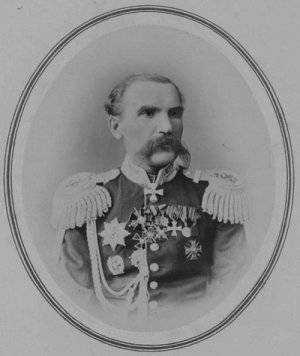 Already being retired, Dmitry Alekseevich Milyutin undertook to write memoirs. In the memories of those years, he noted: “Keeping a newspaper controversy on matters purely political was, of course, not a matter of the War Department, but my repeated attempts to convince our Vice Chancellor to take on himself to lead alongside the diplomatic war and the newspaper war had no success ... Meanwhile, ignoring such a powerful tool, what is the seal in our time, under the circumstances, was even dangerous. The Ministry of the Interior also did not take the initiative. That is why I decided to take on the case, which I fully recognized as alien to the Ministry of War. ”
Already being retired, Dmitry Alekseevich Milyutin undertook to write memoirs. In the memories of those years, he noted: “Keeping a newspaper controversy on matters purely political was, of course, not a matter of the War Department, but my repeated attempts to convince our Vice Chancellor to take on himself to lead alongside the diplomatic war and the newspaper war had no success ... Meanwhile, ignoring such a powerful tool, what is the seal in our time, under the circumstances, was even dangerous. The Ministry of the Interior also did not take the initiative. That is why I decided to take on the case, which I fully recognized as alien to the Ministry of War. ”Meanwhile, the War Minister undertook a very thoroughly “newspaper war”. During one of the audiences with Alexander II, he proposed to issue a special leaflet for European newspapers with news and explanations of what is happening in Russia, especially about Polish affairs. Agreeing on the need to influence Europe’s biased opinion on the Russian-Polish issue, the emperor ordered the editorial board to allocate special funds for publishing a number of brochures in Russian and foreign languages.
From 1864 onwards, a secret newspaper supplement, a lithographed sheet Correspondence Russe, began to be published in French, German and English. This secret edition was sent to well-known foreign editors who pledged to print this information about Russia on the pages of their newspapers. The success of the new edition was such that after a few years it was impossible to point out to one of the most common French or German newspapers, in which articles appearing in Correspondence Russe would not be reprinted weekly.
As a result, in Europe, judging about Russian affairs on the publications of revolutionary emigrants, public opinion favorable for Russia began to take shape. The secret of the secret application was protected so zealously that even the heir-crown prince, the future Alexander III, only accidentally found out about his existence only in the 1868 year and began to receive a “single copy” sent by the editors not abroad.
INDEPENDENT the tone of the articles of the “Russian invalid”, invisibly supported by the emperor, led repeatedly to misunderstandings. The appearance of “inconvenient and inappropriate articles” in a newspaper was repeatedly reported to Milyutin by a censor. He, like many who read them, was of course unaware that the articles had passed before the approval was submitted to the Minister of War, and often to the emperor himself. Such misunderstandings ended with the release of the “Russian Disabled Person” from the censor ...
And here is a letter from the chief of the gendarmes and the head of the office of Department III of the office of his imperial majesty. “Another respectable censor,” thought Milutin about the disapproving comments about publications in the newspaper, which we had to hear from different people - from those whom he considered to be his opponents, and from his supporters: how many people, so many opinions. Both the senators and persons under the emperor expressed discontent.
Milyutin's thoughts were interrupted by a knock at the door. Dmitry Alekseevich looked at the dial of the floor clock. 9 evenings. Colonel Zykov, the General Staff, arrived with a galley of the future issue of the Russian Disabled Person.
Zykov replaced Romanovsky as editor. But Colonel Trotsky Vitaly Nikolayevich, another deputy editor, a newspaper business, he asked for a drill position and soon transferred to Turkestan, later became a full general. A thirty-five-year-old Zykov, taking the editorial place, became a reliable assistant to Milutin.
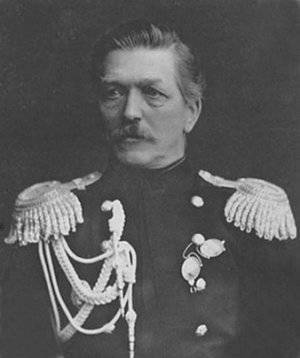 By the time he was appointed editor of the newspaper, a graduate of the 1 Cadet Corps and a graduate of the Imperial Military Academy showed himself in scientific work and combat activities. Being in the commission of General Totleben, Zykov compiled most of the first volume of the “Description of the Defense of Sevastopol”, and for the differences in the suppression of the Polish uprising, during which he commanded a separate detachment and defeated a large gang of insurgents at the town of Lochin, was awarded a golden weapon.
By the time he was appointed editor of the newspaper, a graduate of the 1 Cadet Corps and a graduate of the Imperial Military Academy showed himself in scientific work and combat activities. Being in the commission of General Totleben, Zykov compiled most of the first volume of the “Description of the Defense of Sevastopol”, and for the differences in the suppression of the Polish uprising, during which he commanded a separate detachment and defeated a large gang of insurgents at the town of Lochin, was awarded a golden weapon.“Come in, Sergey Pavlovich,” Milyutin invited the newspaper’s editor. “Read it,” he handed Zykov a message from Prince Dolgorukov.
When the reading of the letter was over, the Minister of War put it back in the envelope and set it aside. The will of the emperor, set forth in it, was not subject to discussion. Although both officers, like the majority in the army, condemned the sovereign's passion for Prussians, his open statements of sympathy for the successes of German weapons.
While the sovereign rejoiced at the successes of his uncle and friend, the future emperor Wilhelm I, most of the thinking people of Russian society, with the possible exception of the approximate emperor and the Baltic Germans, watched the formation of a powerful new power in the middle of the European continent. The unpleasant distribution of the Russian orders to the Germans looked unpleasant: the crosses of St. George rained down on the German generals and officers, as if they were fighting for the interests of Russia. At the same time, Russian heroes were not once bypassed.
Milyutin could not influence Alexander II’s policy towards Germany. For this it would be necessary to go on a direct break with the emperor. And this for the Minister of War was impossible, and would not lead to any positive results. Despite his disagreement with the activities of Alexander II on some issues, the Minister of War respected his courageous and energetic actions, which were transforming Russia literally before our eyes.
* * *
LIGHT the fate of a public figure who has chosen the path of reform. If revolutionists of all stripes promise quickest prosperity by revolution (revolution - rotate, return back) and the destruction of the old, if conservatives point out the need to destroy malicious innovations in order to return to the old “golden days”, then the reformer can only require intense hard work, the results of which may affect, most likely, in the near future.
The reformer is a conservative for revolutionaries and a revolutionary for conservatives. Therefore, it is a target for those and for others. It was not by chance that Alexander II, who did as much for the relief of the people’s fate as none of his predecessors did, was forced to hide from the nobility behind the doors of secret committees, at whose meetings new reform projects were discussed. And he became a target for revolutionary bombers. None of the kings seemed to be hunted with such fury. Berezovsky, Karakozov, Solovyov, Khalturin ...
Due to these circumstances, the environment of Alexander II was changing, becoming more and more conservative. In the 1868 year, as several years earlier, a new fierce campaign began against Milutin. The Interior Minister was led by Adjutant General Alexander Timashev, as well as by the chief of gendarmes and the head of the III department of the office of His Imperial Majesty Adjutant General Count Peter Shuvalov.
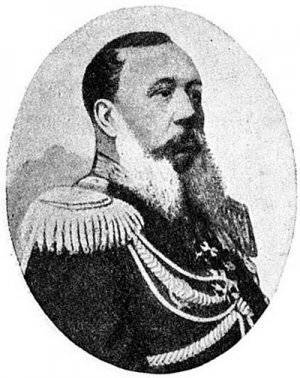 THIS TIME The attack was directed primarily against the "Russian Disabled". By that time, the idea of creating a single official newspaper, “Government Gazette,” which was supposed to “take away any official character” from other newspapers, primarily from the “Russian Disabled Person”, was vital in the higher spheres. They also presented the General Report on the harmful direction of the body of the Ministry of War. The Council of Ministers, having discussed this issue, decided to stop the publication of the “Russian Disabled Person”.
THIS TIME The attack was directed primarily against the "Russian Disabled". By that time, the idea of creating a single official newspaper, “Government Gazette,” which was supposed to “take away any official character” from other newspapers, primarily from the “Russian Disabled Person”, was vital in the higher spheres. They also presented the General Report on the harmful direction of the body of the Ministry of War. The Council of Ministers, having discussed this issue, decided to stop the publication of the “Russian Disabled Person”. October 27 1868 of the Year was followed by the Highest Order of the publication of the Government Gazette from 1869 of the year, and on the same day Russian Disabled received a notice of the discontinuation of the newspaper’s launch on January 1 of 1869. It was repeated fourteen times.
However, this notification was premature. A month later, the Minister of War received the highest order that the “Russian invalid” should be published in the future. But on special grounds. The newspaper ceased to be general political, becoming a purely military.
Began a new stage in its history. Maj.-Gen. Peter Kononovich Menkov, editor-in-chief of the General Staff magazine, headed the joint editorial office of the newspaper Russky Invalids and the Military Collection magazine.
And Sergei Pavlovich Zykov had the opportunity to prove himself in the commission of the Adjutant General Skolkov for a detour and reorganization of Siberia. In the 1878 year, when he foresaw a possible war with England, he was appointed Chief of Staff of the Marine and Coastal Defense of Kronstadt. Subsequently, he was on the military-scientific committee of the General Staff. At the same time he continued to write. He was a regular employee of St. Petersburg Vedomosti, Otechestvennye Zapiski, Military Collection, edited Russian Antiquity for several years, Compiled, wrote, translated into Russian more than a dozen books.
Served by Sergei Pavlovich Zykov full general. This was one of the outstanding editors of the Russian Disabled, in which the newspaper became a phenomenon in Russian public life.
The military press of Russia probably didn’t know of a similar take-off that the Russian Disabled had in the military department under the Minister Milyutin.
Information